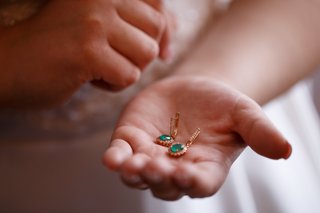Current Trends in Jewelry
Sustainable Jewelry: As environmental consciousness grows, sustainable and ethically sourced jewelry is becoming increasingly popular. Brands are utilizing recycled metals, conflict-free gemstones, and transparent sourcing practices to appeal to eco-conscious consumers.

Minimalist Designs: Simple, elegant pieces are in vogue. Minimalist jewelry emphasizes clean lines and subtle designs, which makes it versatile and timeless.
Personalized Pieces: Customizable jewelry, including name necklaces, birthstone rings, and engraved bracelets, permits a personal touch that produces each piece unique.
Vintage and Antique: Vintage and antique jewelry pieces are cherished for history and craftsmanship. They feature a sense of nostalgia as well as design elements not commonly present in modern pieces.
Bold Statement Pieces: Conversely, bold and oversized jewelry can also be trending. Chunky necklaces, large hoop earrings, and statement rings can add a dramatic flair to any outfit.
Colored Gemstones: Beyond traditional diamonds, colored gemstones like sapphires, emeralds, and rubies are gaining popularity for their vibrant hues as well as appeal.
Strategies for Buying Jewelry
Set a Budget: Determine how much you're ready to spend prior to starting shopping. This can help narrow down options and prevents overspending.
Research and Educate: Understand the basics of knickknack, including various kinds of metals, gemstones, and settings. Information about the 4Cs of diamonds (cut, color, clarity, and carat) is especially useful in case you are buying expensive jewelry.
Choose Reputable Retailers: Purchase from reputable jewelers who provide certificates of authenticity and provide return policies. Try to find reviews and ratings to make sure credibility.
Inspect Quality: Check out the craftsmanship with the piece. Look into the prongs, clasps, and overall finish. Ensure gemstones are securely set and metals have high quality.
Understand Warranties and Policies: Be aware of the store's refund policy, warranties, and services like resizing and cleaning. This may save you hassle and extra costs down the road.
Consider Timelessness: While trends are appealing, consider pieces which will remain stylish over time. Timeless designs can offer lasting value and versatility.
Customization Options: Many jewelers offer customization services. Personalized jewelry may add sentimental value and make sure the piece matches your specific taste.
Insurance: For valuable pieces, you will want insurance. This gives peace of mind in the event of loss, theft, or damage.
Important Considerations
Metal Types: Common metals include gold, silver, platinum, and titanium. They all have its own properties and price points. Gold comes in various purities (karats), and silver can tarnish over time without proper care.
Gemstone Quality: If purchasing gemstones, consider factors like natural vs. lab-created stones. Lab-created stones are often more affordable and possess fewer imperfections.
Ethical Sourcing: Make sure the jewelry is sourced ethically. Conflict-free diamonds and fair-trade gemstones are increasingly important to many buyers.
Resale Value: Some jewelry retains non bluffer than others. Gold, platinum, and high-quality diamonds routinely have good resale value.
Occasion and Purpose: The objective of the purchase can influence your choice. Engagement rings, anniversary gifts, or everyday wear pieces may require different considerations.
Trends vs. Classics: Balance trendy pieces with classic designs. Trendy jewelry may be fun but can not stay in style, while classic pieces offer long-term appeal.
Buying jewelry is a personal and quite often emotional experience. Whether you’re selecting a piece to get a special occasion or increasing your collection, understanding current trends, quality indicators, and your own preferences will make the process more fulfilling and successful. By considering these pointers and considerations, you may make informed decisions and find pieces that may bring joy and cost for years to come.